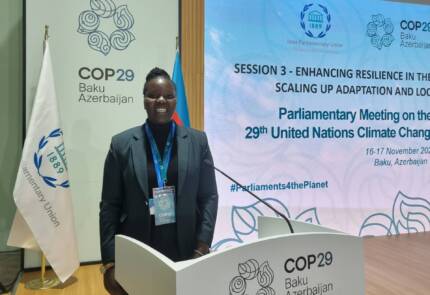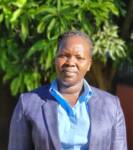
 My name is Ayoo. I live in Uganda now, but I’m originally from South Sudan – and my life as a climate activist is deeply intertwined with my personal experiences as a foreigner: I grew up in a refugee camp.
My name is Ayoo. I live in Uganda now, but I’m originally from South Sudan – and my life as a climate activist is deeply intertwined with my personal experiences as a foreigner: I grew up in a refugee camp.
As a refugee, I have witnessed firsthand how the lack of reliable energy affects daily life, limits opportunities, and increases dependence on resources that can be costly or harmful. We relied heavily on the forest — it was our supermarket, providing food, firewood, and income. My parents depended on charcoal production as their only source of livelihood.
When I was 13, my father passed away and my mother turned to farming, but prolonged droughts often left us without a harvest, and with no food. I turned to climate activism not because of idealism, or wanting to do the right thing. I did it because climate change is a very real and painful part of my life.
The climate crisis is further displacing refugees who had already fled their countries due to conflicts or environmental crises. In Uganda this year, prolonged droughts prevented many of these communities from harvesting crops, exacerbating food insecurity and violence. And while these people are within those who have contributed the least to creating this crisis, they are certainly some of those who suffer the most.

Meeting with a community. Photo credit: Ayoo’s personal archive
My life taught me that the fights against the climate crisis and for better life conditions are one and the same. While seeking to help fellow refugees in Uganda, I became passionate about advocating for clean, affordable energy solutions – and now I’ve been selected as one of the 275+ local climate leaders joining 350.org’s Renew Our Power gathering in Brazil, in April 2025. It will be a unique opportunity to connect with other activists, exchange knowledge, and amplify the voices of refugees in the renewable energy conversation.
I work with Last Mile Climate as a partnership officer and refugee fellow with Refugees International, and our organization advocates for renewable energy by advancing solar electric cooking solutions. We want to transition 150,000 refugee and host community households in Uganda to clean, solar-powered cooking by 2027. This will not only reduce the reliance on polluting firewood, but also improve health conditions and help safeguard income for these communities.
My goal is to leverage the knowledge and networks I gain in the gathering to advocate on a larger scale, influencing policies that support renewable energy access for refugees and host communities, and creating a broader impact across Africa.

Ayoo at 2024’s UN Climate Summit, COP29. Photo credit: Ayoo’s personal archive.
“A world with climate justice would be one where: wealthy nations take responsibility for their emissions by paying for the damage they cause; affected communities, including refugees, are included in climate negotiations; and equal access to climate financing is ensured for all”
The Renew Our Power gathering will provide me invaluable connections, insights, and potential partnerships that would strengthen our efforts to support displaced communities – in Africa and around the world. But getting there wouldn’t be possible for many of us without funding: visas, traveling expenses and food cost quite a lot, especially for those of us coming from developing countries. But you can contribute to make it possible!
Help renew and multiply this power – our collective power. And together, we will create a ripple effect all over the world!
You can support more activists like me to get to the Renew Our Power gathering. Chip in today and help us build power through and for communities!
The post As a refugee, climate change is a very real and painful part of my life appeared first on 350.
